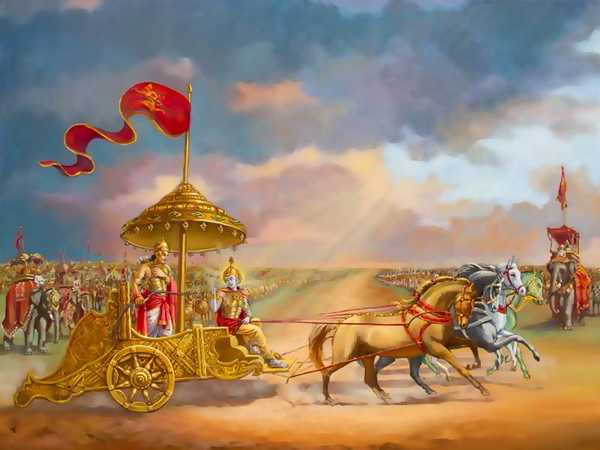Chapter 50

“Aswatthaman said, ‘The kine, O Karna, have not yet been won, nor havethey yet crossed the boundary (of their owner’s dominions), nor have theyyet reached Hastinapura. Why dost thou, therefore, boast of thyself?Having won numerous battles, and acquired enormous wealth, and vanquishedhostile hosts, men of true heroism speak not a word of their prowess.Fire burneth mutely and mutely doth the sun shine. Mutely also doth theEarth bear creatures, both mobile and immobile. The Self-existent hathsanctioned such offices for the four orders that having recourse to themeach may acquire wealth without being censurable. A Brahmana, havingstudied the Vedas, should perform sacrifices himself, and officiate atthe sacrifices of others. And a Kshatriya, depending upon the bow, shouldperform sacrifices himself but should never officiate at the sacrificesof others. And of Vaisya, having earned wealth, should cause the ritesenjoined in the Vedas to be performed for himself. A Sudra should alwayswait upon and serve the other three orders. As regards those that live bypractising the profession of flowers and vendors of meat, they may earnwealth by expedients fraught with deceit and fraud. Always actingaccording to the dictates of the scriptures, the exalted sons of Panduacquired the sovereignty of the whole earth, and they always actrespectfully towards their superiors, even if the latter prove hostile tothem. What Kshatriya is there that expressed delight at having obtained akingdom by means of dice, like this wicked and shameless son ofDhritarashtra? Having acquired wealth in this way by deceit and fraudlike a vendor of meat, who that is wise boast of it? In what singlecombat didst thou vanquish Dhananjaya, or Nakula, or Sahadeva, althoughthou hast robbed them of their wealth? In what battle didst thou defeatYudhishthira, or Bhima that foremost of strong men? In what battle wasIndraprastha conquered by thee? What thou hast done, however, O thou ofwicked deeds, is to drag that princess to court while she was ill and hadbut one raiment on? Thou hast cut the mighty root, delicate as thesandal, of the Pandava tree. Actuated by desire of wealth, when thoumadest the Pandavas act as slaves, rememberest thou what Vidura said! Wesee that men and others, even insects and ants, show forgivenessaccording to their power of endurance. The son of Pandu, however, isincapable of forgiving the sufferings of Draupadi. Surely, Dhananjayacometh here for the destruction of the sons of Dhritarashtra. It is true,affecting great wisdom, thou art for making speeches but will notVibhatsu, that slayer of foes, exterminate us all! If it be gods, orGandharvas or Asuras, or Rakshasas, will Dhananjaya the son of Kunti,desist to fight from panic? Inflamed with wrath upon whomsoever he willfall, even him he will overthrow like a tree under the weight of Garuda!Superior to thee in prowess, in bowmanship equal unto the lord himself ofthe celestials, and in battle equal unto Vasudeva himself, who is therethat would not praise Partha? Counteracting celestial weapons withcelestial, and human weapons with human, what man is a match for Arjuna?Those acquainted with the scriptures declare that a disciple is no wayinferior to a son, and it is for this that the son of Pandu is afavourite of Drona. Employ thou the means now which thou hadst adopted inthe match at dice,–the same means, viz., by which thou hadst subjugatedIndraprastha, and the same means by which thou hadst dragged Krishna tothe assembly! This thy wise uncle, fully conversant with the duties ofthe Kshatriya order–this deceitful gambler Sakuni, the prince ofGandhara, let him fight now! The Gandiva, however, doth not cast dicesuch as the Krita or the Dwapara, but it shooteth upon foes blazing andkeen-edged shafts by myriads. The fierce arrows shot from the Gandiva,endued with great energy and furnished with vulturine wings, car, pierceeven mountains. The destroyer of all, named Yama, and Vayu, and thehorse-faced Agni, leave some remnant behind, but Dhananjaya inflamed withwrath never doth so. As thou hadst, aided by thy uncle, played a dice inthe assembly so do fight in this battle protected by Suvala’s son. Letthe preceptor, if he chooses fight; I shall not, however, fight withDhananjaya. We are to fight with the king of the Matsyas, if indeed, hecometh in the track of the kine.'”




